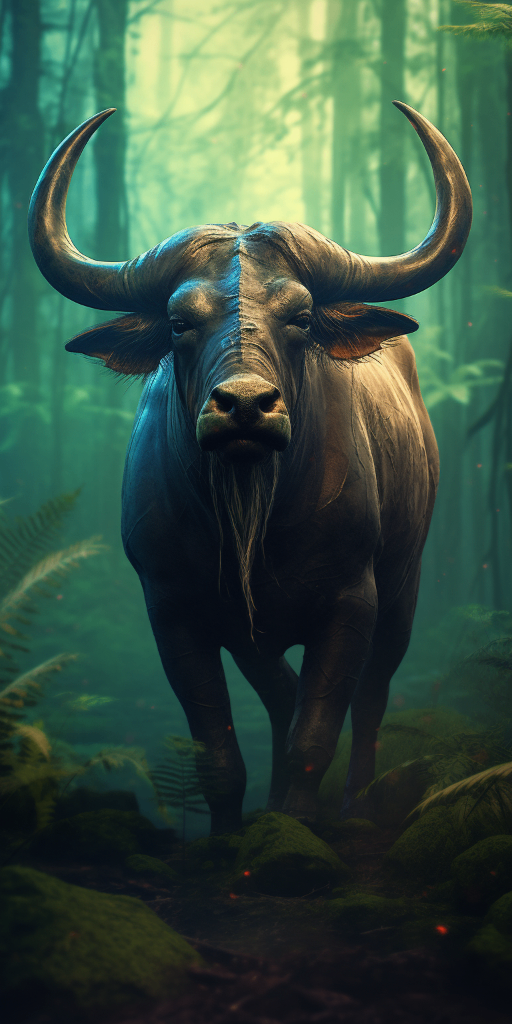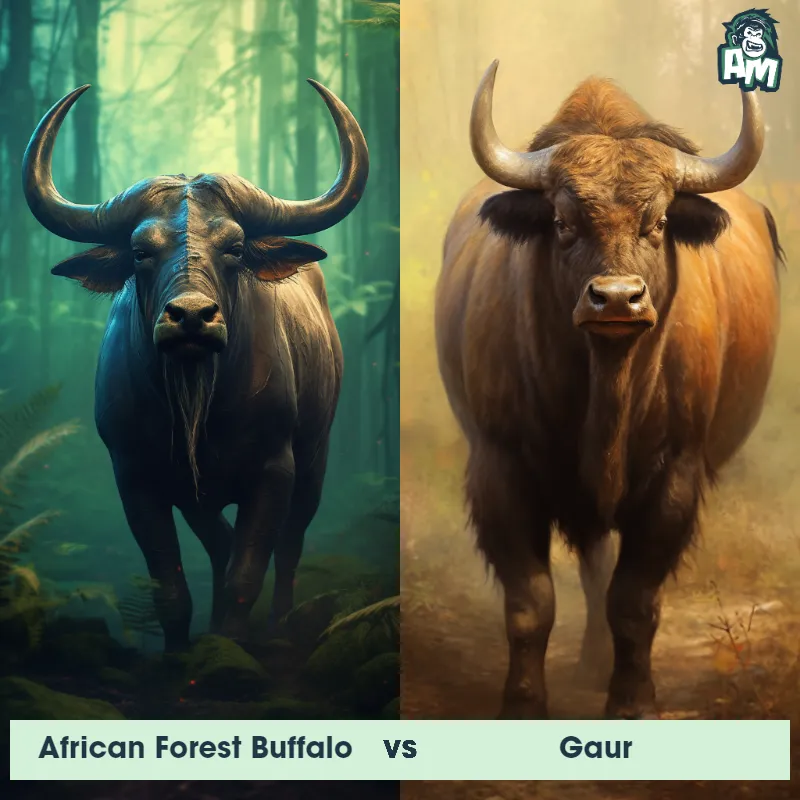The African Forest Buffalo
The African Forest Buffalo, also known as Syncerus caffer nanus, is a large and robust animal found in the dense forests and swamps of central and western Africa. It is a close relative of the African Savannah Buffalo, but smaller in size. The African Forest Buffalo has a dark brown or black coloration, with a shaggy coat and strong, curved horns that sweep upward and backward. They have a stocky body with a pronounced shoulder hump, adapted to maneuvering through the thick vegetation of their habitat.

| African Forest Buffalo | |
|---|---|
| Size | Up to 1.5 meters (4.9 feet) tall at the shoulder |
| Weight | Up to 900 kg (1,984 lbs) |
| Speed | Speed: 30 mph (48.28 km/hr) |
| Key Strength | Powerful charge and sharp horns |
| Biggest Weakness | Poor eyesight and slow turning ability |
| Scientific Name | Syncerus caffer nanus |
| Family | Bovidae |
| Habitat | Dense forests |
| Geography | Central and Western Africa |
| Diet | Herbivorous, feeding on grasses, leaves, and fruits |
| Lifespan | 15 years - 25 years |

The African Forest Buffalo
The African Forest Buffalo, also known as Syncerus caffer nanus, is a large and robust animal found in the dense forests and swamps of central and western Africa. It is a close relative of the African Savannah Buffalo, but smaller in size. The African Forest Buffalo has a dark brown or black coloration, with a shaggy coat and strong, curved horns that sweep upward and backward. They have a stocky body with a pronounced shoulder hump, adapted to maneuvering through the thick vegetation of their habitat.
Fun Fact: African Forest Buffalos are excellent swimmers and can be found wading through rivers and swamps to cool off and escape predators.
| African Forest Buffalo | |
|---|---|
| Size | Up to 1.5 meters (4.9 feet) tall at the shoulder |
| Weight | Up to 900 kg (1,984 lbs) |
| Speed | Speed: 30 mph (48.28 km/hr) |
| Key Strength | Powerful charge and sharp horns |
| Biggest Weakness | Poor eyesight and slow turning ability |
| Scientific Name | Syncerus caffer nanus |
| Family | Bovidae |
| Habitat | Dense forests |
| Geography | Central and Western Africa |
| Diet | Herbivorous, feeding on grasses, leaves, and fruits |
| Lifespan | 15 years - 25 years |
African Forest Buffalo Matchups
We use AI to simulate matchups between the African Forest Buffalo and other animals. Our simulation considers size, strength, and natural predatory behaviors to determine the most likely outcome.
African Forest Buffalo: Diet, Predators, Aggression, and Defensive Behaviors
What do African Forest Buffalos eat?
African Forest Buffalos primarily feed on grasses, herbs, shrubs, and fruits found in their forest habitat. They are herbivores and grazers, spending a large portion of their day foraging for food.
Do African Forest Buffalos have any predators?
African Forest Buffalos face threats from predators such as lions, leopards, and crocodiles. These predators typically target weaker or younger individuals in a herd, making them vulnerable to attacks.
Are African Forest Buffalos aggressive?
African Forest Buffalos are known to be more aggressive than their savanna counterparts. They can exhibit territorial behavior and show aggression towards perceived threats, including humans. It is important to give them distance and respect their space when encountered in the wild.
Do African Forest Buffalos engage in fights?
African Forest Buffalos are known to engage in fights within their own herds, especially during mating season or when establishing dominance. These fights can be intense and involve head-butting and charging at each other to establish hierarchy within the group.
How do African Forest Buffalos defend themselves?
African Forest Buffalos have various defense mechanisms to protect themselves from predators and rivals. They will use their horns to ward off threats, charge at aggressors, and group together to form a defensive stance when faced with danger.
What is the biggest weakness of African Forest Buffalos in a fight?
One of the biggest weaknesses of African Forest Buffalos in a fight is their tendency to isolate themselves from the herd when injured or threatened. This can make them more vulnerable to predator attacks or facing multiple opponents without the protection of the group.
Fun Fact: These buffalo live in herds that can range from a couple of individuals to large groups of up to 100 members, led by a dominant female.
Fun Fact: The African Forest Buffalo plays a crucial role in seed dispersal in their ecosystem, as they consume fruits and vegetation and spread seeds through their dung, assisting in the regeneration of the forests they inhabit.















